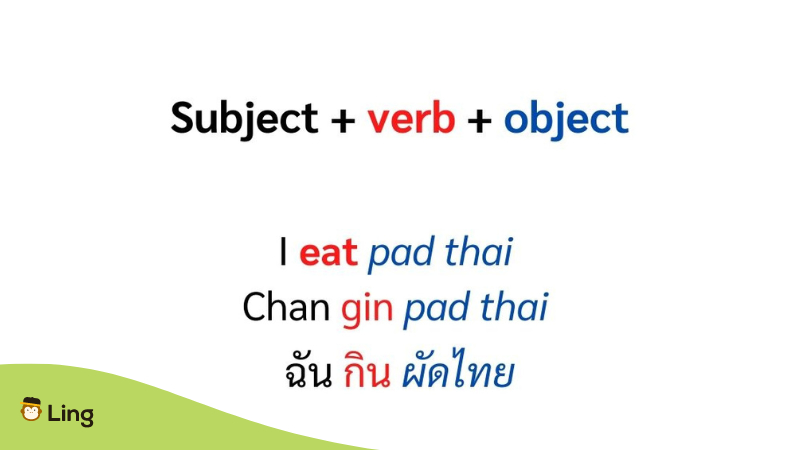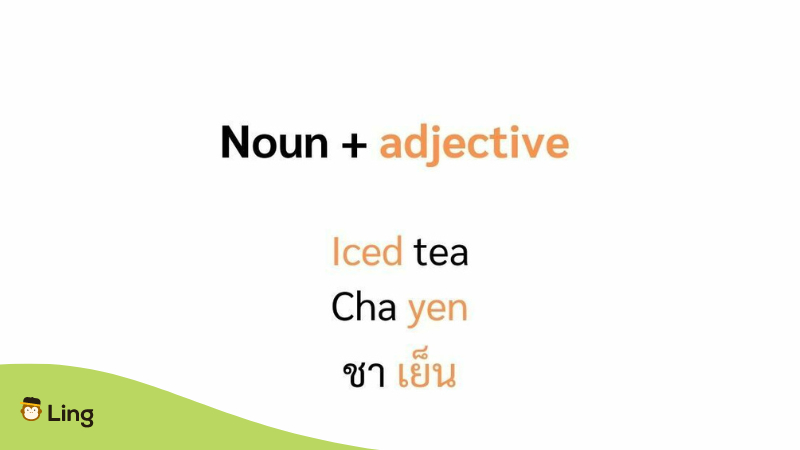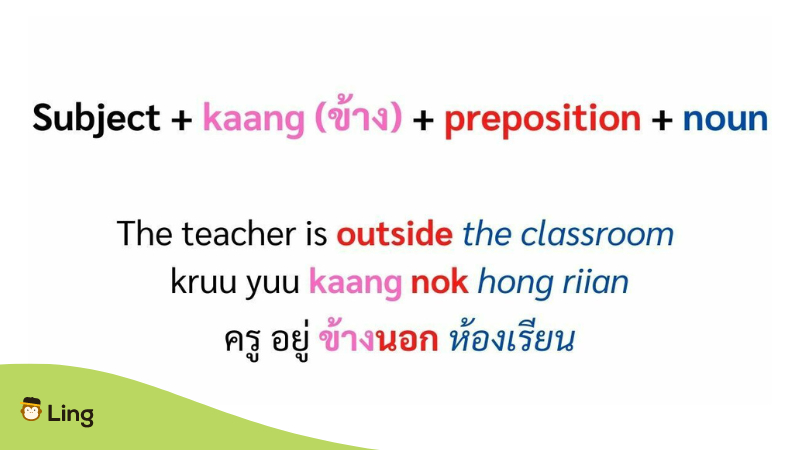Thai sentence construction is probably going not the very first thing you concentrate on when you think about studying the language. Nevertheless, as you begin to progress, you can see that the best way phrases are ordered in a sentence is a crucial consideration that drastically impacts the that means of what you need to say.
For those who’ve ever tousled Thai grammar when speaking to shut buddies and kin, you recognize the awkward feeling of being corrected. However to not fear! Thai grammar is fairly simple to be taught and to get a cling of.
That can assist you keep away from extra awkward conditions, we are going to take a look at Thai sentence construction and the way it impacts the best way Thai is written and spoken.


Fundamental Thai Sentence Construction
Essentially the most fundamental rationalization of Thai sentence construction is SVO – Topic, Verb, and Object. That is much like English, which signifies that it’s one much less main change to have to think about.
As you may see on this fundamental sentence, it follows the similar basic order as in English.
The topic of the sentence, the particular person or factor that the sentence is about, is adopted by the verb or motion, and eventually, the thing that the topic is performing upon.
Nevertheless, there are a couple of conditions the place the sentence construction would transfer round a bit from this fundamental define.


The place Do Thai Adjectives Go?
Adjectives are a generally used aspect in any language. They assist to explain or modify phrases. Consider phrases like huge, small, and robust.
After all, adjectives are sometimes utilized in Thai sentences too, which begs the query – the place do adjectives go?
The reply is kind of simple, really. They’re positioned after the noun that they’re describing or modifying. Let’s think about that you’re ordering one thing in Thai – a pleasant iced tea.
Right here, you see that the adjective yen (เย็น), or ‘iced’ in English, is positioned after the noun chaa (ชา) or ‘tea’ within the Thai sentence. So, you’ll say one thing like:
English: I wish to order iced tea
Thai: Chǎn kɔ̌ɔ sàng chaa yen (ฉันขอสั่งชาเย็น)
That’s actually all there may be to including adjectives to Thai sentences. Whereas it’s the reverse of how we do it in English, you’ll get the cling of it after some time.
How To Make Thai Destructive Sentences
The best way you make sentences detrimental is through the use of phrases like ‘not’ or ‘no’. The identical is true in Thai, and so they have one magical phrase that may flip nearly any sentence or assertion detrimental – mâi (ไม่).
Right here is an instance of how you’ll match it right into a Thai sentence:
English: I don’t eat pad thai
Thai: Chán mâi gin pàt tai (ชั้นไม่กินผัดไท)
As it’s possible you’ll discover, the detrimental phrase mâi (ไม่) is positioned earlier than the verb. Right here is one other instance that will help you keep in mind:
English: I can not converse English
Thai: Chǎn pûut paa sǎa ang grìt mâi dâi (ฉันพูดภาษาอังกฤษไม่ได้)
The verb right here is dai (ได้). As soon as once more, you may see that to make it detrimental, you place the phrase mâi (ไม่) earlier than it.
Thai Particles That Create That means
In contrast to in English, particles are utilized in Thai as a method to convey emotion, temper, and politeness.
We have now talked earlier than in regards to the well mannered phrases/particles in Thai kráp (ครับ) and kâ (ค่ะ). These are added to make a sentence extra well mannered. Nevertheless, there are a lot of extra particles you need to know too:
English: Pardon?
Thai: À rai kráp (อะไรครับ)
There are additionally particles which might be used to make a sentence of query much less intense or sound softer. Ná (นะ) is an instance of this:
English: What’s it?
Thai: À rai ná (อะไรนะ)
For what it’s value, you may mix two completely different particles to kind one thing like ná ká (นะคะ) that gives the meanings of each particles to your assertion.
On the other finish, there may be wá (วะ), which is used to make a sentence extra intense/sound extra rude. That is almost certainly used if somebody is offended.
English: What the hell would you like?
Thai: À rai wá (อะไรวะ)
The essential factor to recollect is that particles at all times come on the finish of the sentence, even after query phrases and tense phrases. There are numerous examples of particles, and these are just some. These could be very useful to know, so you need to attempt studying them.
Utilizing Thai Tense Phrases
In Thai, verbs aren’t inflected (modified) to point tense as it’s in English. As an alternative, separate time phrases are used.
Let’s check out the completely different phrases you have to use to make use of previous, future, and current tense in Thai and the way they match into sentences.
Thai Previous Tense
Lɛ́ɛo (แล้ว) is an instance of a particle. It doesn’t translate precisely into English, nevertheless it finest interprets to ‘already’. For instance:
English: I already ate
Thai: Chǎn gin lɛ́ɛo (ฉันกินแล้ว)
As you may see right here, lɛ́ɛo (แล้ว) is added on the finish of the sentence. It primarily adjustments the sentence to the previous tense.
One other method to make the previous tense is to make use of time-based adverbs. By including adverbs like yesterday in Thai to the tip of the sentence, you’ll make it previous tense.
English: I ate yesterday
Thai: Chǎn gin mʉ̂a waan níi (ฉันกินเมื่อวานนี้)
Utilizing the phrase mʉ̂a…tîi lɛ́ɛo (เมื่อ…ที่แล้ว) and putting a phrase like every week, month or yr in between, you may speak about what you probably did final week, final month, or final yr:
English: I ate final yr
Thai: Chǎn gin mʉ̂a bpii tîi lɛ́ɛo (ฉันกินเมื่อปีที่แล้ว)
As you may see, this phrase comes on the finish of the sentence as nicely, following the identical fundamental Thai sentence construction talked about above. Nevertheless, issues do change round.
Thai Future Tense
The phrase jà (จะ), that means ‘will’ or ‘shall’, permits a sentence to be modified to the longer term tense. Right here is an instance of that:
English: I’ll eat
Thai: Chǎn jà gin (ฉันจะกิน)
Jà (จะ) is added earlier than the verb to make it future tense, like in English. If you would like the detrimental kind, it is so simple as including the detrimental phrase mâi (ไม่) after it.
English: I cannot eat
Thai: Chǎn jà mâi gin (ฉันจะไม่กิน)
Thai Current Tense
Lastly, for the current tense, gam lang (กำลัง) is used.
English: I’m consuming
Thai: Chǎn gam lang gin (ฉันกำลังกิน)
On this case, gam lang ought to be added earlier than the verb. This may be the equal of including ‘ing’ to an finish of a verb in English.
Now, if you wish to change it to a detrimental, as in ‘not consuming’, you’ll use mâi dâi gam lang (ไม่ได้กำลัง):
English: I’m not consuming now
Thai: Chǎn mâi dâi gam lang gin/chǎn mâi dâi gin (ฉันไม่ได้กำลังกิน/ฉันไม่ได้กิน)
These signify the so-called ‘steady tense’ the place you might be presently performing the verb.
One other phrase that you have to know is yang (ยัง). It’s best translated to English as ‘but’, so you may in all probability see how will probably be utilized to the sentence in Thai.
Normally, you will notice it paired with the widespread verb phrase mâi dâi (ไม่ได้), that means ‘can not’. Collectively, they kind the phrase ‘not but’ – ‘yang mâi dâi‘ (ยังไม่ได้).
English: I’ve not but eaten
Thai: Chǎn yang mâi dâi gin (ฉันยังไม่ได้กิน)
On this case, the time/tense phrase goes earlier than the verb.
Total, the completely different placements for these phrases make it a bit tougher to be taught and keep in mind, however you’ll ultimately get used to it.
Remembering Thai Query Phrases
Query phrases, together with why, what, the place, and when are positioned on the finish of a sentence in Thai, whereas in English, they often go at first. Right here is an instance of a query:
English: What’s going to I eat?
Thai: Chǎn jà gin à rai dii (ฉันจะกินอะไรดี)
À rai (อะไร) means ‘what’ which you’ll see is positioned proper on the finish of the query. This isn’t too troublesome to get used to.
What’s tougher is the phrase mǎi (ไหม). This phrase could be seen because the equal of a query mark. It may be used to vary a standard sentence to a query.
English: Need to eat?
Thai: Gin mǎi (กินไหม)
On this case, simply the verb with the query phrase types an entire query, although that is extra casual.
Once more, it’s positioned on the finish of the sentence. We will do one thing comparable in English by inflecting our voice (e.g., asking a good friend ‘eaten?’ along with your voice rising would have the identical implication).
Nevertheless, since Thai is a tonal language, inflections can’t be used. It is usually value noting that punctuation is almost fully absent from Thai.
In any other case, there are additionally some ‘yes-no’ questions that you could be come throughout. These are often very quick and have a easy construction:
English: …or not?
Thai: Rʉ̌ʉ mâi (หรือไม่)
One other widespread instance of this you’ll hear is:
English: …proper?
Thai: Châi mái (ใช่ไหม)
Once more, these observe that very same fundamental sentence construction for questions in Thai.


Utilizing Thai Prepositions
Prepositions are definitely not the simplest idea to get your head round, however they do serve an essential function for Thai grammar.
Primarily, prepositions in Thai can help you hyperlink collectively two phrases in a sentence. That is often between the thing and the topic of the sentence. Examples of prepositions embrace on, in, above, behind, and close to.
So then, how do they match into the Thai sentence order? It depends upon which sorts of phrases are concerned. By that, I imply, if the preposition is utilized to something however a noun, it’s positioned on the finish of the sentence. You’d additionally embrace the phrase kâang (ข้าง) earlier than these prepositions.
Within the case that the proposition is positioned earlier than a noun, then the preposition will come earlier than the noun, and you’ll drop the phrase kâang (ข้าง) if you wish to.
How Do You Say Sentence Construction In Thai?
In Thai, sentence construction is known as kroong sâang bprà yòok (โครงสร้างประโยค)
.
For those who’re going to be taught extra about Thai sentence construction and different associated subjects, understanding vocabulary phrases associated to grammar is a should. See the desk under for related vocab!
Suggestions On Thai Sentence Construction
To place what you’ve discovered into motion, consider these 5 ideas under:
- At all times keep in mind the fundamental sentence construction. Sentences begin with the topic, then verb, then object.
- When including phrases like particles or adjectives to sentences, memorize their placements. Adjectives go after the noun or verb, and particles are inclined to go on the finish of the sentence. Negation phrases go earlier than the verb, and query phrases go after the sentence.
- For those who use the phrase mʉ̂a…tîi lɛ́ɛo (เมื่อ…ที่แล้ว) and putting a phrase like every week, month or yr in between, you may speak about what you probably did final week, final month, or final yr.
- Converse in Thai to your loved ones and buddies. Publicity to the language’s sentence construction organically is one of the best ways to be taught!
- Use the Ling app and different methods of studying Thai on-line. Studying and writing Thai might help reinforce Thai sentence construction in your thoughts.
With the following pointers above, try to be mastering Thai’s sentence construction and grammar very quickly!
Steadily Requested Questions About Thai Sentence Construction
1. Is Thai A SOV or SVO?
Thai is an SVO language. When developing Thai sentences, you begin with naming the topic, then the motion that topic takes, and the thing affected by that motion. Examine this to SOV languages like Japanese, Korean, or Turkish. These languages begin with the topic, then the thing, then motion.
2. Why Do Individuals Finish Sentences With Ka?
Kâ (ค่ะ) is a female politeness particle utilized in Thai on the finish of sentences. The masculine equal is kráp (ครับ). Thai individuals use these after they need to emphasize the extent of politeness in a sentence. It’s possible you’ll discover that each one Thai audio system finish their sentences with these particles!
3. How Is Thai Grammar Completely different From English Grammar?
English grammar is mostly extra inflexible than Thai grammar. Some main variations are that Thai has no verb conjugations, the presence of particles, and eventually one other main distinction is that modifiers go after the noun. These variations could make Thai grammar troublesome to know at first, however many learners get used to it over time and with apply.
Thai Sentence Construction Is Not So Tough
Including to that, there aren’t any articles, which is general good because it means fewer phrases to recollect. There are, nonetheless, time phrases and phrases that specify when an motion occurred, figuring out the tense.
Query phrases will even affect how a sentence is made. You’ll need to familiarize your self with these to extend your fluency and talent to construction sentences in Thai.
When you grasp sentence development, you can also make much more advanced sentences and perhaps even impress your kin or buddies who’re native Thai audio system!
Grasp Thai Language Grammar In the present day
Utilizing this data, it’s attainable to position collectively sentences utilizing the vocabulary you recognize to speak along with your family members. Think about the shock after they see your Thai abilities in motion!
One nice method to be taught Thai language anyplace and at any time is through the use of on-line language studying apps and programs just like the Ling app!
Ling’s newbie to intermediate items might help you become familiar with Thai sentence construction and educate you priceless vocabulary so you may have deeper conversations with these round you.
If that sounds good to you, why don’t you give the Ling app a shot and enhance your Thai immediately?


